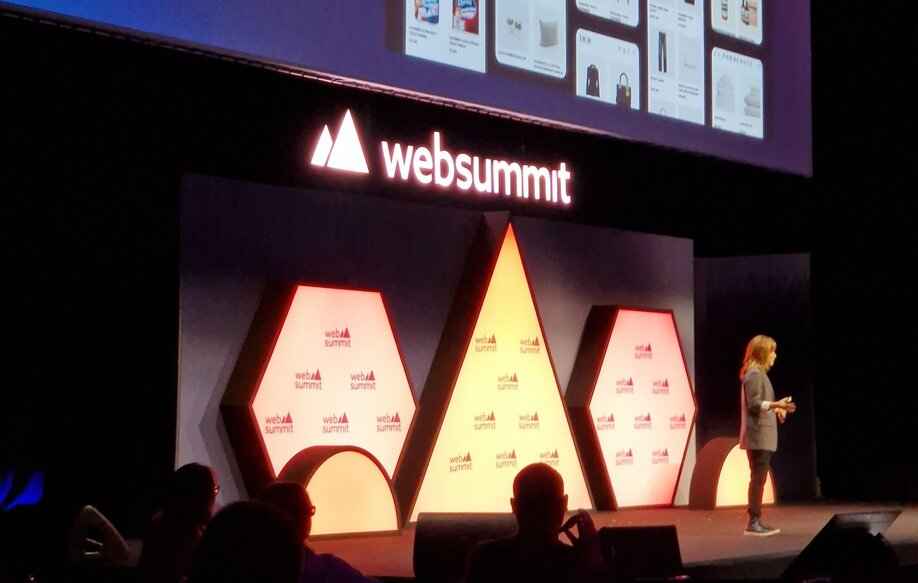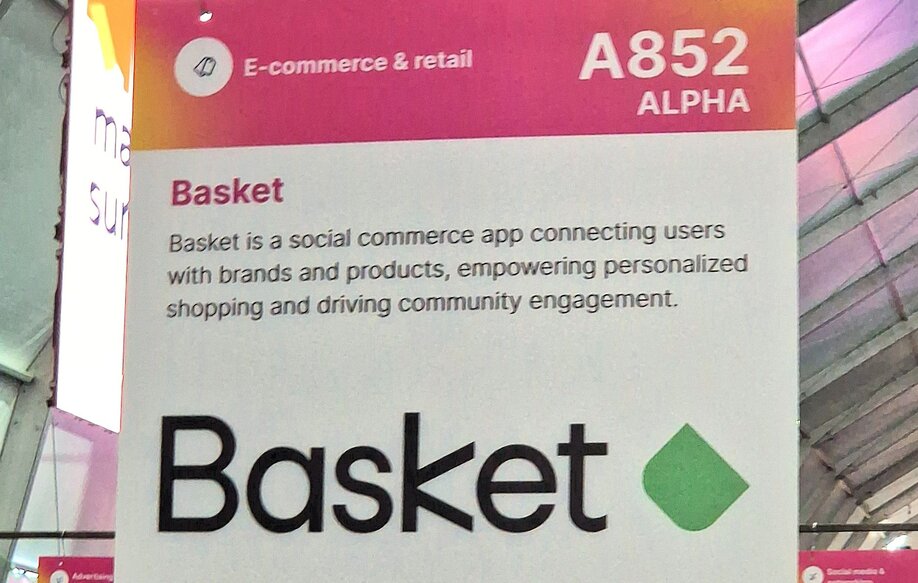Blog post
Insights
🕒 10 min
Web Summit 2024: Takeaways That B2C Commerce Might Not Like
How we’re soon gonna struggle to survive in the new era of naturalized AI-powered eCommerce and marketing

- Clients’ emotions are your currency. Exploit them to your advantage
- The B2C online store is dead, long live the online store!
- “Community” is the new “synergy”
- Social media as a unified eCommerce marketplace for one and all
- Talk, not say: Brands should stop forcing messages on clients
- Gen Z is businesses’ bogeyman
- AI Almighty: Zero-sum or squid game?
- Before you go
Imagine lazy business breakfasts, casual meetup dinners, and relaxed nightclub after-parties… None of it was on our list as we attended the flagship Web Summit event in Lisbon last week. Regardless, to us, it was a feast for the senses anyways.
Nothing like a four-day business conference can be that emotionally pumping and draining simultaneously. But we’re deviating from the script here.
To skip squandering the time heaping praises on how fantastic the whole thing was organized, given its grandeur and scale (standing ovation, indeed), let’s jump to the eCommerce and marketing takeaways we’ve managed to extract while session-hopping.
Ready, go!

Clients’ emotions are your currency. Exploit them to your advantage
Doesn’t sound like a million-dollar pointer, but still. The marketing panel majorly centered around seeing products as emotional triggers or potential pieces of customer experience, rather than physical objects underlying a set of functions and features.
Again, this isn’t to reinvent the wheel—we’re all well aware of experiential or engagement marketing and emotional purchases.
It’s just that technique-wise, brands are highly likely to soon move their play in the UX department to an unseen level, reimagining the whole shopping journey and stealing the traditional marketplaces’ thunder.
In what way exactly? Let’s see…

The B2C online store is dead, long live the online store!
Much like the Author who dropped dead in Roland Barthes's literary theory back in the sixties, B2C online stores may (or may not) stop defining the "ultimate meaning" of customer journey as a whole. Could be. Who’s in command instead then?
Right, it’s the customers themselves. But only provided the brands get their game on with AI and start actively building communities around them. Thus, chances are that we lose the traditional B2C marketplace as an unnecessary intermediary in the process of product search and purchase.
The Web Summit speakers made a lot of informed and agreeable guesses on the topic. Besides, the ideas were much consistent with what our CEO and Founder, Dmitry Bogdanov, envisioned this year.

“The web store is going to transform into a set of data on products, brands, their voices, and target clients. In line with one-to-one marketing principles, the AI agent will be able to build personalized storefronts that factor in individual customers’ behaviors and preferences.”

The idea looks thrilling on paper. Yet, we cannot but throw in a healthy doubt—isn’t it a bit (a lot) overwhelming for the user from the UX standpoint?

“I keep picturing that. Every morning, as I browse my go-to website, I am to scrape through a different UI composition, renewed color scheme, and settings. Just because the AI factored in today’s weather, my poor sleep and blood sugar level, and whatnot.
Hello, do I even know this website? A pretty infinite nightmare. Exaggerating a bit, but you get the picture. At the very least, the whole thing is cognitively draining.”

Speakers also emphasized the importance of customer data security. Right, isn’t quite an illuminating insight, but worth reminding the brands to safely store their clients’ data in cybersecure warehouses, without leaving a chance for third-party companies to obtain the valued feed. You fail to handle this—you’re finished. Ancient history, instantly.
Indeed, the beauty part is the customer journey of the upcoming eCommerce era. Here are some stunning speaker takes on that:
- Say, a personal AI assistant could snatch a moment to remind a customer their running sneakers are wearing out. Time that they consider a brand-new pair! Irresistible.

- Happened upon your dream interior design while watching an occasional video? Just feed the AI copilot a screen and grab the cart with all the furnishing in it.
- Any group chat may well become a shopping journey in itself, with shared payment, buy-now-pay-later, and whatnot. Take a messenger, or any kind of community portal, and imagine it provides a built-in marketplace functionality.
This, actually, is the most intriguing trend we’d love to elaborate on carefully. But first, we cannot but pop in with a teeny-tiny artistic license.
“Community” is the new “synergy”

Speaking of the community. The C-word bomb dropped so frequently and was so very up in the air… There was hardly a place to be hiding from it. Now that we cannot possibly hear it buzzing another time, we’re especially reluctant to nuke you with a double force—”influencer community”. Terribly sorry in advance.
Back to the plot.
Social media as a unified eCommerce marketplace for one and all
Could we be any more dissatisfied with today’s browsing experience? Hardly imaginable, given how countless were the speeches containing a renowned four-letter word that denotes being bad or unpleasant.

Long story short, the internet is still a toddler, far from its prime of life. Each step of our online journeys, cookies keep popping in our faces to kill the vibe properly. While in our ideal world, we’d appreciate surfing, searching, and buying at a mere click.
Right, we’re here alluding to the idea of embedded commerce, or guided shopping, if you will. Whatever you call it, this is a sort of domesticated online marketplace containing shoppable images. These are interactive pictures enabling users to directly go to product pages by just clicking specific image areas.
Take a typical influencer community. Say, Swifties, or whoever. Members are dying to know what surrounds their icon, what she wears, and what she has for breakfast. DM is hardly a stellar idea, forget it. Shortly, socials will nail the task for the users.
With built-in AI image and video recognition patterns, social media can redirect you to the products you fancied on your idol, also suggesting similar options based on your shopping history. Enjoy all pricing options for all walks of life.
This is nothing but shop as you scroll, without leaving your fave social networks. Not that you wanted to purchase anything, but now that it’s right at your fingertips… Disarming live shopping.
Brands should be jumping for joy, elbowing each other to integrate their products into popular media and start winning their very own followers. The eternal circle from brand to marketplace influencer community, pardon the jargon.

Oh, let’s dwell on the brands and their voices a bit, by the way.
Talk, not say: Brands should stop forcing messages on clients
Symptomatically, at the Web Summit we’ve heard an opinion going that brands are to rethink their strategies for communicating messages to the clients. The common trend to relabel the former audience into a community clearly shows the brands feel the change within the power balance.
Whereas “audience” feels like a passive subject, “community” is closer to a social actor (hey, Max Weber). Indeed, the market has the grounds for the renaming, as today, clients, or communities, claim dialog. They are unwilling to give an ear to pretentious convictions or blanket statements.
Meaning, there’s no escape from rationalizing the clients’ opinion in social media and all around the digital. In a word, making feedback-attributed improvements is a must if you do care about your business continuity in the upcoming Love or Cancel era.
In this regard…
Gen Z is businesses’ bogeyman
No secret that companies are grossly preoccupied with Gen Z. As the obsession balloons, businesses are increasingly scared the Zoomers are lurking up every corner to come and get them. To that end, the impulse is to radically repurpose sales in line with the youngsters’ demands.
But hey, isn’t there a catch? Hang on a minute and take a practical view of the situation. The fact that Gen Z is so extremely loud and incredibly close doesn’t necessarily mean it’s them who are YOUR customers. Knowing who IS,—that’s what really matters.


“To me, the trick is to stop overcomplicating things. Provided that Gen Z eggheads seemingly crave synthetics holey zip sweaters, yet your cashmere is selling like hotcakes, there apparently is an expectations-reality mismatch.
So, not that it was a nugget of wisdom, but just a reminder to thoroughly analyze your data feed. Keep on with your socials tracking routine, extract the stats, do the math, and make informed decisions.”

AI Almighty: Zero-sum or squid game?
And here we are again. AI is steadily the talk of the town, whatever the event. The dilemmas are pretty much the same as well:
- How do we do more good, and less evil with the tech? (Hit-or-miss methods, continuous improvement)
- Where can it handle the hardest routine? Be of help, not nuisance? (Arguably, healthcare, finance, and logistics)
- What if the Artificial General Intelligence projects succeed? How do we treat the AGI monster tech as individuals? As a society, humanity? (Like someone actually asks each opinion)
- What are the ways to delicately regulate AI across the industries, without killing its potential? (Get up steam, folks within each vertical)
- What about the countries with lower democracy index? Any ideas on how they can stand their ground? (Zero ideas)
- Sensationally, isn’t the AI yet another nothing-burger? (Hope dies last)

Before you go
What else is there to say?
- For all we know, more holy wars are expected around robotics.
- Meanwhile, brace yourself to keep breaking lances over the AI. Its earthmoving machine’s gonna run all over the global market, and this most certainly will hurt.
- Both the internet and online commerce will inevitably transform, mature, and revive, taking bizarre forms.
- As an attempt to somehow brightside the mixed findings, we’d just rephrase the line from Dan Rogers's (CEO at LaunchDarkly) speech,—move fast, break nothing.
It’s ours to cautiously make a way to the brave new world of tomorrow’s tech and online experiences, no matter how scared of it we are. Breakthroughs are painful, after all.
Last updated: November 22, 2024
About the authors

Marches right into the thick of all digital and physical, finding the revolutionary paths, and taking practical steps to square the circle. Succeeds in it.

Democratizes those royally sophisticated tech phenomena by means of concise copy and occasional wit.
- Clients’ emotions are your currency. Exploit them to your advantage
- The B2C online store is dead, long live the online store!
- “Community” is the new “synergy”
- Social media as a unified eCommerce marketplace for one and all
- Talk, not say: Brands should stop forcing messages on clients
- Gen Z is businesses’ bogeyman
- AI Almighty: Zero-sum or squid game?
- Before you go

Use Marketplacer SaaS as a springboard to unbeatable offerings
Ask us how

Keep track on the latest trends in web
Let’s nail another market-shaking project together! While you are thinking, check out our latest ones.